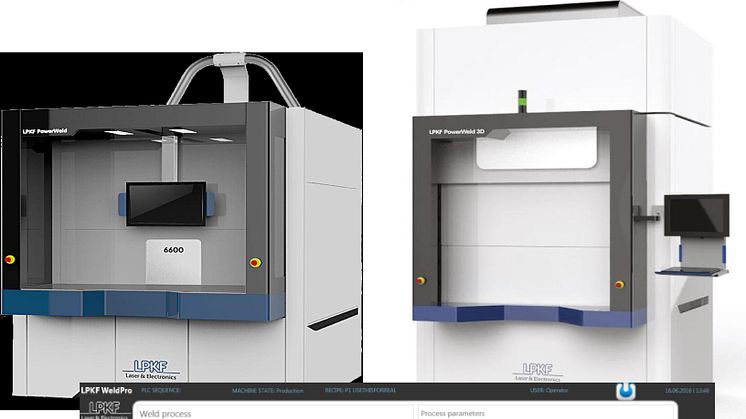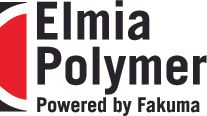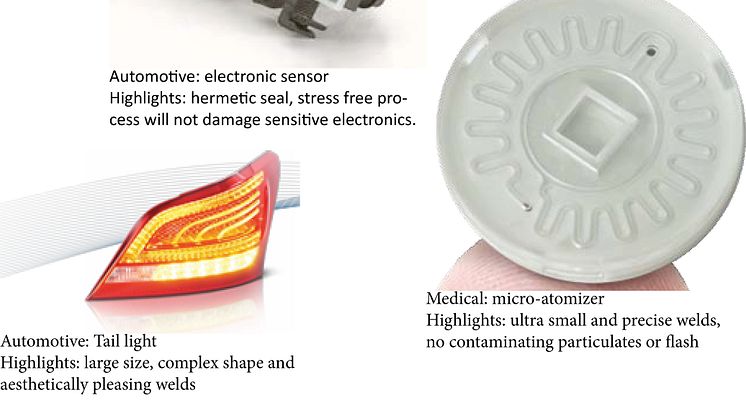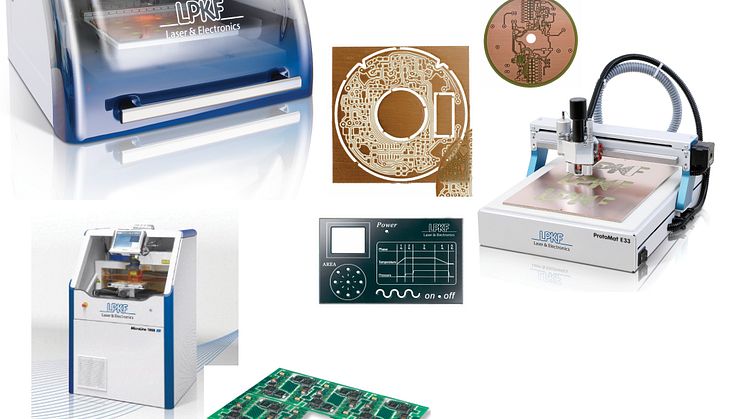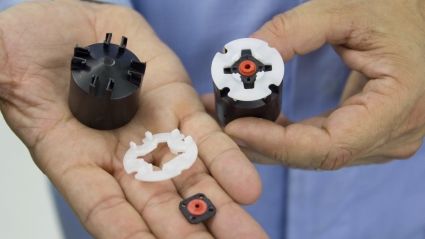
Nyhet -
Innovative automative products made by laser welding
Alfmeier, the automotive subcontractor, creates innovative seating comfort components.
The manufacturer is right in line with the latest trends with its products: components are
becoming increasingly smaller and lighter, at the same time as boasting a rising functional
density. This means that the plastic components must not only be manufactured extremely
precisely, and have very stable and tight connections, but also be of the highest quality. The subcontractor describes how it integrated innovative laser plastic welding systems into its
industrial production lines.
The owner-operated Alfmeier Präzision AG, is an internationally-oriented, innovative manu-
facturer of precision components (valves, actuators and pumps). The company is in great
demand amongst the major automotive OEMs, especially for the development of innovative
fluidic system solutions, and their industrial production at a very high quality standard and
with extremely high precision. The manufacturer supplies static comfort systems for car seats
(lumbar supports, side bolster adjustment, SMA valves), dynamic comfort systems (massage systems, distribution valves), head rests (foldable and lowerable), and pressure supply systems
(air compressors installed in either the seats themselves or in the trunks).
Laser plastic welding has underpinned many product innovations at the automotive subcon-
tractor Alfmeier, some of which could not have been achieved without laser plastic welding technology in the first place. The manufacturer now also uses laser systems in its international factories.
Automotive trends: smaller, lighter, more functions
The seats are adjusted using air cushions which can be filled and emptied in the seat
by a pump and a valve unit. “The major automotive manufacturers stipulate very high
demands when it comes to seat comfort components. Even after seven days, the
pressure loss in the air cushion must not exceed 10 per cent. This in turn means that
the plastic components need to have very tight connections of the kind that can
basically only be achieved by using particle-free manufacturing methods,” reports
Uwe Neumann, Head of Central Maintenance and Industrial Engineering at Alfmeier.
His colleague, Manfred Kowalzik, Head of Production in Gunzenhausen, lists the trends: seats
are becoming narrower, and the components have to be smaller and lighter. At the same time,
they also have to be more adjustable. This enables the car seats to be directly adjusted to the anatomy of the passengers. In the case of dynamic seats, they enable the backbone and
muscles of the driver to be gently massaged to avoid muscle fatigue and back ache.
Very high specifications for the joining method
“The dimensions of the components have been halved in size over the last three
years to be able to make even narrower seats,” says Uwe Neumann, confirming the
trend. He lists five specifications which are essential to enable these components
to be produced with the demanded quality:
- Cleanliness: The smaller the components become, the more sensitive the valves of the inlet
and outlet systems, for instance, react to contamination of any kind. The production processes therefore have to be as particle-free as possible, to ensure that no leaks can develop in the
sealing system.
- Flexibility in selecting shapes and sizes: Alfmeier is well known for its innovative
components. Their design and production activities therefore use plastic components with
very variable contours, short bridges, and close separations.
- Component precision: The smaller the components, the more complex the contours, with specifications for precision in the µ-range. The production and joining technologies therefore
have to become ever more precise.
- Tightness and strength: The stringent specifications for maximum pressure losses can
only be satisfied by very tight and strong components and joints.
- Economic efficiency and production practicality: Economical production of a growing
number of versions requires lower costs for tools and maintenance, short setup times, and minimum effort when changing products.
“We have used laser plastic welding technology for more than ten years for joining plastic components. This method has crucial advantages, particularly when it comes to the clean-
liness aspects. We are therefore able to manufacture actuators for extremely small installation spaces. Moreover, its flexibility enables us to create completely new component geometries.
It also works very precisely, is ideal for industrial manufacturing, and delivers very reliable results,” explains Manfred Kowalzik. The production manager confirms that the laser
technology is used to support many product innovations at Alfmeier – some of which could
not have been achieved in any other way. The manufacturer now uses several laser systems
in its factories. However, converting to laser plastic welding in the first place was not a foregone conclusion.
Conversion to laser plastic welding
The plastic components for the seating comfort systems are manufactured in
the company’s own injection molding machines, and joined together using laser
technologies to create complex seating comfort components. The company initially
used different joining methods, but these are no longer used for new products,
particularly because of the very high stipulations for cleanliness. Lasers were first
used 16 years ago. Before converting to LPKF laser plastic welding technology,
a specifications sheet was stipulated listing the specs such as setup times, cycle
times and traceability. The decision was then taken to implement the technology,
and the company ordered the laser systems. However, the first products already
had to be sent to Alfmeier’s clients before the series systems could be supplied
and integrated.
But this was no problem because LPKF’s Laser Plastic Welding Application Center
was able to fill the gap. The tests were carried out on products here before creating
the first samples and prototypes on series-near systems. The Application Center
evaluated the tests using the new technology, and worked together with Alfmeier
employees to implement process optimizations. LPKF also stepped in to produce
the first mini batches. “This technology was completely new for us. We had no
experience at all with parameterization and process layout. We worked together
with the LPKF specialists to elaborate standards and design guidelines for laser
welding. This support was extremely valuable,” reports Manfred Kowalzik.
LPKF also assisted Alfmeier during series production with the implementation of the first laser
series systems. The service contract stipulates 24/7 service, with a spare parts inventory
managed by LPKF. Establishing their own in-house know-how, as well as knowing that
consultants are available in the background, is very important for Uwe Neumann: “Although
we have trained our own welding specialists in the meantime, we can rely on support from
the LPKF experts whenever we need it. We are now already using the laser know-how
proactively during the design stages to enable us to optimally implement the specifications demanded by our customers. This has enabled us to find an ideal solution to satisfy every
demand we have so far faced.”
Alfmeier has continually expanded its use of laser plastic welding. The technology was initially
only used in its headquarters in Treuchtlingen in Central Frankonia in Germany. The laser
systems have now been successfully rolled out to its factories in the Czech Republic, USA,
Mexico and China.
Series production and quality assurance
Thanks to its intrinsic qualities, laser welding has many very special advantages when
it comes to satisfying the high quality specifications stipulated by the automotive sector.
Laser welding is a contactless technology which reduces the mechanical stress on the
components to a minimum. There are absolutely no vibrations. Laser welding requires
no foreign bodies or additives; the joins are insensitive to temperature differences; and
the welded surfaces satisfy the highest optical demands. This technology also supports
online process monitoring. Alfmeier for instance uses operating data gathering to collect
the information made available by the system, such as welding time and welding path,
and integrates this in its traceability system.
“Laser technology has proven itself time and again in our production activities. It is a very
quick process boasting welding times between 0.5 and 4 seconds. It works very cleanly, is
very flexible, and provides us with all the data we need for our quality assurance,” is how
Uwe Neumann sums up his experience with laser welding technology. He also considers
the reliability and service qualities of the provider to be another very important detail for the
usability of the technology. Neumann and Kowalzik are very satisfied in this regard: they
have nothing but praise for manufacturer LPKF in terms of reachability and communications.
The service provided by LPKF is always reliable, and they have always satisfied their
agreements. He refers as an example to the response to a slightly more complex specification
for one of the laser stations. LPKF immediately got everything up and running to solve the
problem. In addition to the service technician, LPKF also sent out an electronics expert so that
the solution was quickly found.
Neumann does, however, see a problem with the response of the automotive customers:
“The opportunities opened up by the new laser technology have generated so many new
requests from our customers that we are barely able to satisfy them.”
LPKF Laser & Electronics AG
If you have any questions, if you would like to have some moore information please contact:
SOLECTRO AB
Tel: +46-(0)40-536600
www.solectro.se
